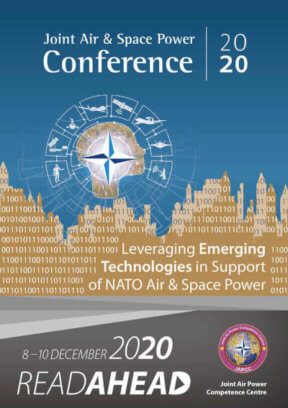Esteemed Colleagues,
When our way of life is threatened, we look to science and technology to save us. This is as true of our most current crisis – the Covid-19 pandemic – as it was of other global threats in the past – wars, famines, expansionist regimes and so on.
The few paragraphs I have written here will take you (very approximately) 2.5 minutes to read. The read ahead material that my words precede will, I am sure, take you considerably longer. However, the enforced delay to the conference does allow you the extra time to do this. I do urge you to invest this time – it is a wise investment, in more ways than one.
This read ahead material represents the largest ever submission of articles from air and space power experts worldwide to a JAPCC publication. Many of these have been specially written for this year’s Joint Air and Space Power Conference. As you read and critically appraise the articles, you will want to make notes and (perhaps furiously!) underline and highlight those parts that you take issue with. Please do this! I well remember a professor who exhorted her students (myself included) to personalise their set texts by scribbling notes in every available blank space. Her assertion was that, only by doing this, could we engage sufficiently with the material and make it our own.
As a young man (so many years ago now!) one of my favourite UK television programmes was called Tomorrow’s World. During the 1970s, it attracted 10 million viewers a week and focused on the science and technology that we could look forward to transforming our lives for the better in the future. The final panel of the conference attempts to do something similar in terms of technological crystal ball gazing. As I still do not have my own personal jet-pack, I tend to treat any predictions for the future with healthy scepticism. I am writing this in late May 2020 and I would be very brave (some might say foolish!) to even try and predict what will be happening in the world as the conference takes place in December.
The only thing we can predict with any confidence is that bad things will happen. Unfortunately, we are not very good at saying what those bad things might be or exactly when they might happen. We must, therefore, set the conditions (and, above all, make the necessary investments) to ensure that we can pre-empt and prevent as many bad things from happening as possible. But for the bad things that do still leak through – Covid-19, for example – we have to remain agile and adaptive enough to first buy the time to analyse them before we can, ultimately and hopefully, defeat them. In addition to money, this requires clever, creative people who can work together to share, adapt and create new ideas and new solutions.
The four panels of the 2020 JAPCC conference cover a lot of ground, and air, and space for that matter – all of it completely fascinating. However, if you let the conference become no more than a collection of experts telling you what they think, then you risk wasting a lot of what the conference is really about. Above all, the JAPCC conference is a forum for debating and exchanging views with the ultimate aim of creating new ideas and knowledge. We should all contribute to that.
I have been part of many JAPCC conferences now, both as a JAPCC SME when I wore RAF uniform and as a civilian. One of the great things about the JAPCC conference is that, whilst we hear from the smart people on the platform, we also get to hear from some of the smartest other people in the room. By which I mean those of you sitting further back in the auditorium – and with (relatively) less in the way of gold braid on your hats and jackets. I am very aware that one of my most important roles as the moderator is to ensure that there is sufficient time to hear from you in the discussions that follow each panel. I think you will find that this year’s agenda and format lends itself nicely to that increased audience participation. In the meantime, if as you read and think critically about the articles within you are moved to respond immediately, please reach out to me or to the JAPCC directly at .
I would like to conclude by thanking the JAPCC for inviting me back as Moderator for their conference again this year. This is, in no small part, due to the positive feedback from many of you who attended in 2019. So, thank you to you all and I look forward to meeting, and hearing from many of you, in December.
Bruce Hargrave BSc MBA
Independent Air and Space Power Consultant








